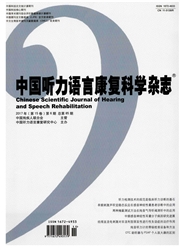

 中文摘要:
中文摘要:
目的探讨语前聋青少年人工耳蜗植入患者发音清晰度、嗓音特点及其影响因素,为研究影响人工耳蜗植入患者言语清晰度的机制提供相关资料。方法8例资料完整的语前聋青少年人工耳蜗植入患者,分别进行耳蜗听力测试、发音清晰度评估及嗓音声学参数测试。结果发音清晰度与嗓音声学参数中的基频标准差(FOSD)及耳蜗听力有统计学上的相关性。相关系数分别为-.767(P〈0.026)和-.726(P〈0.041);多元回归分析只有FOSD对发音清晰度有影响。结论人工耳蜗植入患者对音调的控制能力是影响言语清晰度的因素之一。患者发声时基频的变化,能够客观地反映人工耳蜗植入带来的听力补偿及形成的听觉-发音环路对发音准确度的影响。对音调的控制能力是评价人工耳蜗植入效果的有效手段之一。
 英文摘要:
英文摘要:
Objective To explore speech characteristics of prelingual deafened teenagers with cochlear implants and to assess related factors and mechanisms. Methods 8 prelingual deafened young teenagers were tested for hearing levels, speech articulation and voice acoustics parameters after cochlear implants. Results Speech articulation and fundamental frequency standard deviation (FOSD) in voice acoustics parameters were correlated with cochlear hearing level, and the coefficients were -.767(P〈 0.026)and -.726(P〈 0.041).Multiple regression analysis found that only FOSD had some effects on speech articulation. Conclusion The ability of the patients to control tones after cochlear implant demonstrated some influence on speech articulation. Hearing compensation and factors influencing speech articulation could be assessed through analyzing the ability to control speech sound fundamental frequency(F0).
 同期刊论文项目
同期刊论文项目
 同项目期刊论文
同项目期刊论文
 期刊信息
期刊信息
